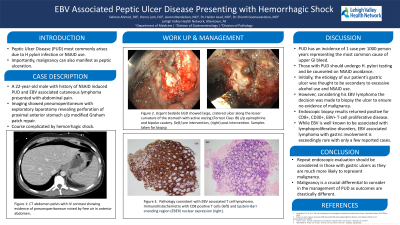Monday Poster Session
Category: GI Bleeding
P2534 - EBV-Associated Peptic Ulcer Disease Presenting With Hemorrhagic Shock
Monday, October 28, 2024
10:30 AM - 4:00 PM ET
Location: Exhibit Hall E

Has Audio

Salman Ahmed, DO
Lehigh Valley Health Network
Allentown, PA
Presenting Author(s)
Salman Ahmed, DO, Henry Lam, DO, Aaron Mendelson, MD
Lehigh Valley Health Network, Allentown, PA
Introduction: Peptic ulcer disease (PUD) involves ulceration of the stomach or duodenum. Most commonly it is associated with H. pylori infection or NSAID use. Importantly, malignancy can also manifest as peptic ulceration. Here we present a rare case of hemorrhagic shock secondary to recurrent gastric ulcer that was found to be EBV associated lymphoma.
Case Description/Methods: A 22-year-old male with a history of NSAID induced peptic ulcer disease and EBV associated cutaneous lymphoma presented with abdominal pain. CT abdomen pelvis with IV contrast showed pneumoperitoneum concerning for perforation. The patient underwent exploratory laparotomy which revealed a perforation along the proximal anterior stomach status post modified Graham patch repair. Unfortunately, the hospital course was complicated by hemorrhagic shock with melena. Urgent upper endoscopy revealed a large, cratered ulcer with necrotic margins along the lesser curvature of the stomach with a visible vessel and active oozing Forrest Class Ib status post epinephrine and bipolar cautery. Interestingly, the patient had known peptic ulcer disease with gastric ulceration 2 months prior which was thought to be NSAID induced at the time. Upon further questioning the patient reported that he had since stopped using NSAIDs after the last hospitalization. Given persistent gastric ulceration along with clinical history of EBV associated lymphoma, a repeat upper endoscopy was performed with multiple biopsies obtained for tissue sampling. Pathology ultimately returned with findings of EBV associated T cell lymphoma for which the patient was started on chemotherapy.
Discussion: PUD has an incidence of 1 case per 1000 person years representing the most common cause of upper GI bleed. Those with PUD should undergo H. pylori testing and be counseled on NSAID avoidance. Repeat endoscopic evaluation should be considered in those with gastric ulcers as they are much more likely to represent malignancy as was demonstrated in our case. While EBV is well known to be associated with lymphoproliferative disorders, EBV associated lymphoma with gastric involvement is exceedingly rare with only a few reported cases. This case demonstrates the importance of considering malignancy in your differential for the management of PUD as management and outcomes are drastically different.
Disclosures:
Salman Ahmed, DO, Henry Lam, DO, Aaron Mendelson, MD. P2534 - EBV-Associated Peptic Ulcer Disease Presenting With Hemorrhagic Shock, ACG 2024 Annual Scientific Meeting Abstracts. Philadelphia, PA: American College of Gastroenterology.
Lehigh Valley Health Network, Allentown, PA
Introduction: Peptic ulcer disease (PUD) involves ulceration of the stomach or duodenum. Most commonly it is associated with H. pylori infection or NSAID use. Importantly, malignancy can also manifest as peptic ulceration. Here we present a rare case of hemorrhagic shock secondary to recurrent gastric ulcer that was found to be EBV associated lymphoma.
Case Description/Methods: A 22-year-old male with a history of NSAID induced peptic ulcer disease and EBV associated cutaneous lymphoma presented with abdominal pain. CT abdomen pelvis with IV contrast showed pneumoperitoneum concerning for perforation. The patient underwent exploratory laparotomy which revealed a perforation along the proximal anterior stomach status post modified Graham patch repair. Unfortunately, the hospital course was complicated by hemorrhagic shock with melena. Urgent upper endoscopy revealed a large, cratered ulcer with necrotic margins along the lesser curvature of the stomach with a visible vessel and active oozing Forrest Class Ib status post epinephrine and bipolar cautery. Interestingly, the patient had known peptic ulcer disease with gastric ulceration 2 months prior which was thought to be NSAID induced at the time. Upon further questioning the patient reported that he had since stopped using NSAIDs after the last hospitalization. Given persistent gastric ulceration along with clinical history of EBV associated lymphoma, a repeat upper endoscopy was performed with multiple biopsies obtained for tissue sampling. Pathology ultimately returned with findings of EBV associated T cell lymphoma for which the patient was started on chemotherapy.
Discussion: PUD has an incidence of 1 case per 1000 person years representing the most common cause of upper GI bleed. Those with PUD should undergo H. pylori testing and be counseled on NSAID avoidance. Repeat endoscopic evaluation should be considered in those with gastric ulcers as they are much more likely to represent malignancy as was demonstrated in our case. While EBV is well known to be associated with lymphoproliferative disorders, EBV associated lymphoma with gastric involvement is exceedingly rare with only a few reported cases. This case demonstrates the importance of considering malignancy in your differential for the management of PUD as management and outcomes are drastically different.
Disclosures:
Salman Ahmed indicated no relevant financial relationships.
Henry Lam indicated no relevant financial relationships.
Aaron Mendelson indicated no relevant financial relationships.
Salman Ahmed, DO, Henry Lam, DO, Aaron Mendelson, MD. P2534 - EBV-Associated Peptic Ulcer Disease Presenting With Hemorrhagic Shock, ACG 2024 Annual Scientific Meeting Abstracts. Philadelphia, PA: American College of Gastroenterology.

